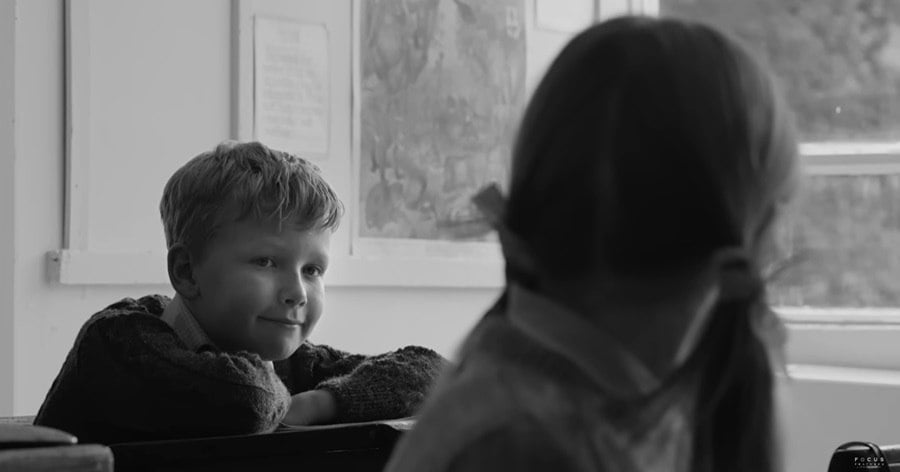Belfast, directed and written by Kenneth Branagh, is a heartfelt drama released in 2021. Set against the backdrop of the tumultuous late 1960s in Belfast, Northern Ireland, the film is a semi-autobiographical exploration of Branagh's own childhood experiences. With stunning black-and-white cinematography, the movie encapsulates the complexities of a community caught in the crossfire of sectarian conflicts and captures the innocence of youth amidst challenging circumstances.
Plot Summary
The film opens with the tight-knit Kerrigan family, consisting of a working-class Protestant father, Gerry (Jamie Dornan), a Catholic mother, Ma (Caitriona Balfe), and their two children, Buddy (Jude Hill) and Willa (Lewis McAskie). The Kerrigans enjoy a simple and happy life in their close community, with Buddy narrating the story from his youthful perspective.
Amidst the joyous moments of familial love and neighbourhood camaraderie, subtle hints of the simmering tensions in Belfast begin to emerge. The innocence of Buddy and his friends is contrasted with the looming societal unrest, as glimpses of violence and political discord start to infiltrate their seemingly idyllic world.
As political unrest escalates, the Kerrigans find themselves caught in the crossfire of sectarian violence. The conflict between Protestants and Catholics intensifies, and the once-unified community fractures along religious lines. This transformation is palpable in the daily lives of the Kerrigans, as the streets they once roamed freely become battlegrounds for larger political struggles.
The family grapples with the challenges of maintaining their unity in a society increasingly divided by religious and political affiliations. Gerry, a former Royal Navy sailor, faces pressure to choose sides, and the threat of violence looms over their everyday existence. The film skillfully portrays the impact of historical events on personal lives, capturing the fear and uncertainty that engulf the Kerrigans.
Faced with the growing danger and the deteriorating conditions in Belfast, the Kerrigans make the difficult decision to leave their beloved home in search of safety and a better future. The sense of loss and displacement is palpable as the family bids farewell to the familiar streets and faces, leaving behind the memories of a life disrupted by conflict.
The departure from Belfast signifies the end of innocence for Buddy and his family. The scars of the sectarian violence have left an indelible mark, and the once-thriving community is now a poignant reminder of the cost of conflict. The Kerrigans embark on a journey that reflects the broader exodus of families seeking refuge from the turbulence of Northern Ireland.
Belfast takes a reflective turn as it jumps forward in time to an older Buddy, portrayed by Judi Dench and Ciarán Hinds as the elder versions of Ma and Pop. The grown-up Buddy is a successful filmmaker who has found success in Hollywood, but the emotional pull of his hometown draws him back to Belfast.
As Buddy revisits the places of his youth, the film delves into the power of nostalgia and the resilience of the human spirit. The contrast between the traumatic past and the vibrant present-day Belfast showcases the city's capacity for healing and renewal. The scars of conflict are still visible, but the community has found ways to rebuild and move forward.
The Ending: Reunion and Resolution
The film culminates in a heartfelt reunion of the Kerrigan family. The older Buddy shares a poignant moment with his younger self, symbolizing a reconciliation with the past and a deep appreciation for the enduring bonds of family. The resolution is a celebration of the resilience of the human spirit, emphasizing the power of love and connection in overcoming the scars of history.
What Does the Ending of Belfast Means
As Buddy reflects on his journey, Belfast becomes a homage to the storytelling that helped shape his identity. The film pays tribute to the transformative power of cinema and the ability of storytelling to preserve memories, heal wounds, and offer solace in times of turmoil.
Belfast is a poignant and evocative exploration of one family's journey through a tumultuous period in history. Kenneth Branagh skillfully weaves together personal narratives with broader historical events, creating a tapestry of emotions that captures the resilience of the human spirit in the face of adversity. The film, rich with nostalgia, showcases the impact of conflict on individuals and communities, emphasizing the enduring power of love, family, and the stories that bind us together. As Buddy revisits his roots and finds closure, Belfast stands as a testament to the indomitable strength that emerges from the crucible of history.






